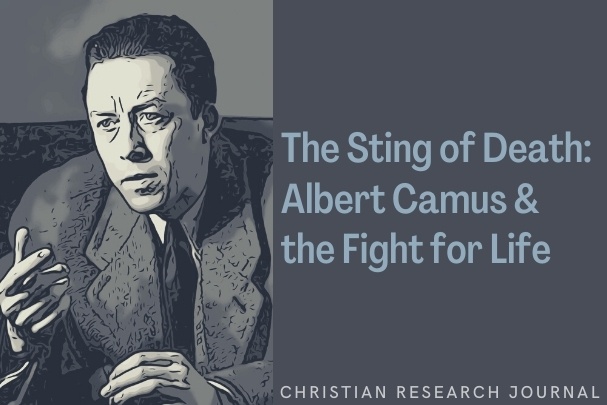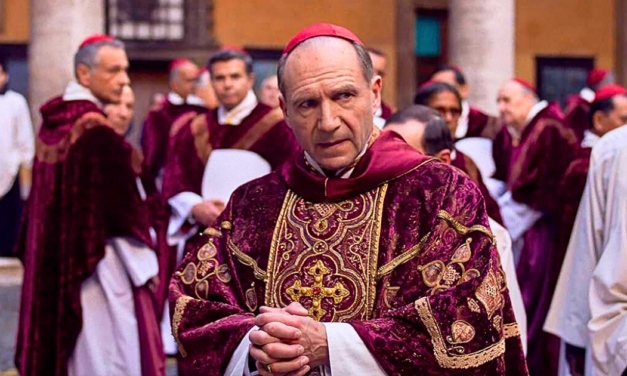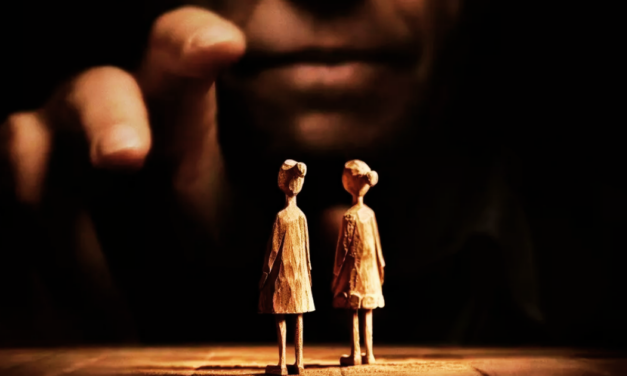This article first appeared in the CHRISTIAN RESEARCH JOURNAL, volume 37, number 06 (2014). Note: This is part of our ongoing Philosopher’s Series.
“Beauty is unbearable, drives us to despair, offering us for a minute the glimpse of an eternity that we should like to stretch out over the whole of time.”
—Albert Camus, Notebooks, 1935–1942
“I know that in order to keep alive, the absurd cannot be settled. It escapes suicide to the extent that it is simultaneously awareness and rejection of death.”—Albert Camus, The Myth of Sisyphus
The Sting of Death: Albert Camus and the Fight for Life
by Stephen Mitchell
In 1942, Albert Camus published The Myth of Sisyphus, a collection of essays that deliver an essential expression of existential humanism. This collection, named for its central symbolic character, considers the question of suicide in the face of meaningless existence. “Why,” Camus asks, “should a human go on living if life has no meaning?” He concludes that life can be lived—even loved—despite the emptiness from which it arises and to which it returns.
Such meaninglessness as Camus describes arises from his lack of religious faith. He once told a gathering of Catholic bishops, “I shall never start from the supposition that Christian truth is illusory, but merely from the fact that I could not accept it.”1 What he does accept are those things of which he feels sure: “This heart within me I can feel, and I judge that it exists. This world I can touch, and I likewise judge that it exists. There ends all my knowledge, and the rest is construction.”2
Unable to penetrate beyond these two certainties, he asks what a human being should make of this existence. The answer makes him compelling for everyone, Christians included: “I know that in order to keep alive, the absurd cannot be settled. It escapes suicide to the extent that it is simultaneously awareness and rejection of death.”3 By acknowledging that death destroys meaning while resisting its power to make him despair, Camus takes up the fight for life.
TENSIONS BETWEEN DESIRE AND REALITY
There is a strong stoic beauty in him—determined as he is to accept the world and himself on the terms given by both, terms that include his yearning heart. To accept this world requires that he obey his own yearning for life. This obedience leads to his most important idea: the absurd. It names the conflict between humans as they are and the world as it is. Camus writes, “The world in itself is not reasonable….But what is absurd is the confrontation of this irrational and the wild longing for clarity whose call echoes in the human heart. The absurd depends as much on man as on the world.”4 This conflict, between an irrational world and the human desire for it to be (morally) rational, births the absurd. Absent either one term or the other, it could not exist.
In a way, the absurd depends on love. Humans desire clarity because they love (or want to love) this world. Such love is uniquely human and thus, for Camus, worthwhile. His love, both for the cosmos and for the human beings inhabiting it, makes him a partisan of life.
Believing as he does in the beauty of human life, Camus understands (as should Christians) that the great conqueror is death. Different is how Camus and a Christian square off against this enemy, though even here there are points of contact. Indeed, Camus is not the first to have discovered the moral absurdity of life. His work echoes discoveries made in both Job and Ecclesiastes that there is no harmony between a human being’s moral standing and the circumstances of his or her existence. As the narrator of Ecclesiastes ruminates, “The wise person has his eyes in his head, but the fool walks in darkness. And yet I perceived that the same event happens to all of them….Why then have I been so very wise? For of the wise as of the fool there is no enduring remembrance….How the wise dies just like the fool!”5 Given such an (apparently) unjust moral structure, Camus aligns himself on the side of justice and life.
Continuing his speech before the Catholic bishops, he pleads, “Perhaps we cannot prevent this world from being a world in which children are tortured. But we can reduce the number of tortured children. And if you don’t help us, who else in the world can help us?”6 Determined to fight evil on all fronts, Camus worked with the French underground against the Nazis during World War II and later boldly criticized postwar communism. Since death is man’s great enemy, he resisted those who would inflict it on others— even and especially in the name of an ideology—articulating, as an essential ethical commitment, the motto: “Without giving up anything on the plane of justice, yield nothing on the plane of freedom.”7
FINDING BEAUTY IN THE BROKENNESS
Like the author himself, Sisyphus is compelling for how he surmounts the irrational. He resolves to accept the burden with which he is cursed (ceaselessly rolling an enormous rock up a mountain only to see it roll back down). By choosing his burden, he negates it as a curse, showing precisely, thereby, the noblest option for living available to a human being if the world is truly absurd. So what if life is meaningless? It is filled, nevertheless, with things that call forth love: sun, ocean, mountains, other human beings. Such love is felt so deep, it becomes something very like praise. Of Sisyphus, granted a short return to earth from the underworld, Camus recalls, “When he had seen again the face of the world, enjoyed water and sun, warm stones and the sea, he no longer wanted to go back to the infernal darkness.”8 Sisyphus shows the kind of love for this world that Christians—who claim to worship its Creator—ought to display at least equally.
Still, the strength of Sisyphus only gets him so far. The rock of his life may reach the top of the mountain, but it does so only to roll back down again at death. Thus all the meaning for which he can hope is that which he creates by his own effort. When he dies, that meaning also dies. And so, unintentionally, Camus points to the human need for a resurrection. Unfortunately, he saw such hope as vain, as inspiring its adherents to turn away from this world in the hope of another. He misunderstood, I think, just how deeply the resurrection affirms this present life and defies the very death that assaults it.
LIFE HAS MEANING
The question of how to live in a meaningless world gets closer treatment in The Stranger, a novel in which the protagonist Meursault commits a wholly irrational murder. Lacking even the most basic ethic by which to choose one thing over another, Meursault murders a man because the sun is in his eyes. The act is wholly irrational; yet French-Catholic society demands an explanation for it, one it can accommodate within its own structure of values. This demand leads to a farcical trial in which Meursault’s emotional insensitivity becomes the main cause of his condemnation. That he showed no emotion when his mother passed away becomes a weightier matter than the actual murder. “Indeed,” the prosecutor concludes, “I accuse this man of burying his mother with crime in his heart.”9
The French people are scared of Meursault because they cannot place him. And yet, however farcical the trial, they do have reason to fear him. The law against murder and the social expectation that a man cry at his mother’s funeral both arise from the belief that human life has value. In society’s view, Meursault’s great crime is not murder but insensitivity to all the shades of meaning that order a society. A woman missing her nose affects Meursault no more than does the death of his mother or a proclamation of love from his girlfriend. For him, all of life is details, and all details are equal. His only means of choosing between different actions is the degree of emotional or physical discomfort that each choice offers. Thus he helps a local pimp write a letter that insults the man’s estranged mistress because he “didn’t have a reason not to please him.”10 Following similar reasoning, he kills the man who stands between him and the cool, shaded spring of water; he lacks a reason not to. So far as he understands choice, shooting a man is morally equivalent to not shooting him.
Though Meursault seems a monster and an anti-Christ to those with French-Catholic sensibilities—however attenuated those sensibilities may be—he is a man perfectly fitted to an irrational world. For him, the absurd does not arise because he does not ask that existence be meaningful. Of course, this same comfortable acceptance of an irrational world puts him at odds with a society erected on the presumption that life has meaning.
Meursault does, however, undergo a significant change after months in a prison cell. He still maintains that life in the face of death is meaningless, but he discovers that he loves living it.11 Thus, life and death are not equal. Though Meursault remains a stranger to the last line of the novel, his conclusion that life is both meaningless and lovely provides the emotional beginnings of a reason not to murder. A full philosophical rebuttal of murder, however, must wait for Camus’s essay The Rebel, published some ten years later.
Of course, suicide and murder are but two ways that death appears in this world. Camus’s novel, The Plague, describes an outbreak of bubonic plague in a small French-colonial city on the coast of Africa. This story explores the human and theological questions that arise in experiences of great suffering. For the plague, which attacks indiscriminately, is horrific and deadly. Like the current Ebola virus, it kills its victims only after causing them tremendous pain. Nor can anyone construct a moral taxonomy by which to discern the afflicted as deserving their punishment and the few who survive as meriting their lives. By all human accounting, the plague is both random and vicious. It leads Dr. Rieux—the lead doctor fighting it—to conclude that God is either impotent or wicked and that the only way to remain human is to fight this nefarious sickness.
Yet The Plague is more compelling for its portrayal of human resilience and solidarity in the face of suffering than for its treatment of the theological questions that suffering presents. For all his verbal artistry, for all his acumen as an existentialist thinker, Camus seems at times unaware of just what Christian belief implies. The priest, at least, is hardly believable. Would a Jesuit with the intellectual gifts of Father Paneloux conclude that he cannot seek aid from doctors when stricken with the plague himself but must instead allow it to take its course as determined by the will of God? I doubt it. Central to a Christian understanding of such evils as plague is the notion that they are not God’s original design but ultimately flow from the work of God’s enemy, Satan, whom to fight is to join ranks with God Himself.12 Still, Camus remains generous to believers. Father Paneloux draws odd conclusions about his own suffering and even sees the plague as the judgment of God upon a sinful city; but he remains a tireless fighter against the disease when it strikes others, even to the loss of his own life.
And strike this disease does. Camus does not shy away from graphic depictions of suffering. The problem is not just that humans die; it is also that we die so horribly—even as children.13 Disease is an assault on the dignity of human existence. Once again, the finest human response is to fight it, a response that makes Camus an ally of Christians who recognize that we reflect God powerfully when we fight whatever would lay indiscriminate waste to those who are His creation. “I can speak only of what I know,” says Camus, “and what I know—which sometimes creates a deep longing in me—is that if Christians made up their minds to it, millions of voices—millions, I say—throughout the world would be added to the appeal of a handful of isolated individuals who, without any sort of affiliation, today intercede almost everywhere and ceaselessly for children and for men.”14
Catholic novelist Walker Percy says of writers that their power comes from an exceptional ability to name the human predicament.15 Camus remains important to Christian thinkers because he names this predicament—one that Christians share—truthfully. His work demonstrates a deep understanding of human nature while his critique of Christian belief provides us the opportunity to sharpen our thinking about the faith. Above all, his request that Christians stand with him as Christians to fight evil shows him to be a humanitarian worthy of respect. His work provides a clear picture of what the apostle Paul calls the sting of death and opens a path for the good news of resurrection.
Stephen Mitchell teaches English at Covenant Day School in Matthews, North Carolina. He holds an MS in English education and an MA in liberal studies. He is a PhD student in humanities.
NOTES
- Albert Camus, “The Unbeliever and Christian,” in Resistance, Rebellion, and Death (New York: Vintage International, 1988), 70.
- Albert Camus, The Myth of Sisyphus and Other Essays (New York: Vintage International, 1983), 19.
- Ibid., 54.
- Ibid., 21.
- Ecclesiastes 2:14–16. All Scripture references are from the English Standard Version.
- Camus, “The Unbeliever and Christians,” 73.
- Albert Camus, “Bread and Freedom,” in Resistance, Rebellion, and Death (New York: Vintage International, 1988), 93.
- Camus, The Myth of Sisyphus, 120.
- Albert Camus, The Stranger (New York: Vintage International, 1988), 96.
- Ibid., 32.
- Ibid., 97, 120–22.
- See Mark 9:38–40.
- Albert Camus, The Plague (New York: The Modern Library, 1948), 19, 193.
- Camus, “The Unbeliever and Christians,” 74.
- Walker Percy, Lost in the Cosmos: The Last Self-Help Book (New York: Farrar, Straus, and Giroux, 1983), 120–21.










